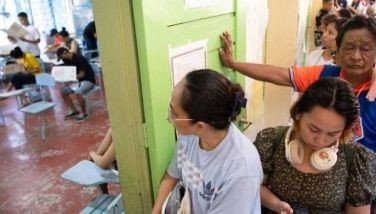The Chinese in us
For the past years, I celebrated the eve of the Chinese New Year buying fortune goodies from a Chinese bakery and placed these on the dining table that is covered with red cloth. On the day of the celebration, I gave the goodies to my relatives. This practice comes with astonishment that a lot of non-Chinese are doing the same. For a lot of akin reasons: affluence and permanence in whatever endeavors and happiness in one's family, the Chinese New Year is practically comparable to the January 1 New Year celebration, an observance that puts high premium on family values and aspiration for good life.
Historically, Chinese have been in the Philippines for so long that a big percentage of Filipinos have Chinese ancestry somewhere along the way. Most are engaged in business, be it food, textile, fashion, furniture, banking, shipping, among others.
Many have succeeded in their fields and that also include medical and law professions, accounting, architecture, engineering, teaching, information technology, arts and design. Prominent Chinese Filipino businessmen were also responsible for creating the "shopping mall culture" that many Filipinos are so proud of, setting up well-known chains of stores like Shoe Mart, Gaisano and Robinsons. Name it and one would find very successful Chinese Filipinos in any of those chosen disciplines.
Contributing widely to the advancement of various fields, many of them are pillars of Philippine society. Their success owes, for the most part, to their pronounced industry, thriftiness/prudence, and business orientation and acumen.
Filipinos of Chinese ancestry form a minority in the Philippine population. Most migrations of Chinese to the Philippines started even before the Spanish colonial period, when foreign trade with other countries was opened to the Philippines. The ethnically Chinese Filipinos comprise 1.3 percent (1.1 million) of the population.
The Tsinoys are like a smaller sub-culture within a larger, encompassing culture. They share a lot of characteristics with us, but they are also unique in their own right. As Tsinoys, they exercise a lot of influences on the Filipino culture as well. Many of their customs and habits-holidays like Chinese New Year and specialty dishes like tikoy, moachi (macie), siopao, siomai, and mami, for example-have already been widely adopted by the mainstream culture. This is primarily due to the sheer number of Chinese Filipinos currently residing in the Philippines. They are considered one of the biggest "Chinese" populations in Asia, comprising nearly 1.6 percent of the total Philippine population as of 2005.
A lot of diffusion of Chinese culture to the Philippine culture had taken place in the whole written history of the country. Explicitly, a lot of food, words and practices are also integrated in the Philippine culture. And it has become a part of our lives to be following Chinese culture and tradition.
The wearing of red or bright and vibrant colored attire during happy and propitious occasions is one thing we got from the Chinese. The offering of food for our dearly departed, and some deities is likewise very much practiced among Filipinos.
It's a heartening reminder of the similarities that we share with Tsinoys as this would bind us to achieve a common goal with maximum results, and not through ineffective discordant fractions.
We as Filipinos have become so accustomed to identifying ourselves in terms of what makes us "different" and "unique" from the next group that we've forgotten how much more important our similarities are, how much more we can grow together if we focus not on idiosyncrasies but on the common threads that bring us together.
It is a question of how Filipinos in general have chosen to identify with each other, opting to focus on the common threads that have long bound us together as one culture and one society. Because at the end of the day, we are all Filipinos living together in one country and the sooner we learn to accept the sooner we can come together as an amalgamated society.
Being Filipino is not about ethnicity. It is about what is in your heart and mind.
To all our Chinese-Filipino brothers and sisters and to everyone, I wish you peace, good luck and prosperity in the Year of the Horse. Kung Hei Fat Choi!
- Latest
























